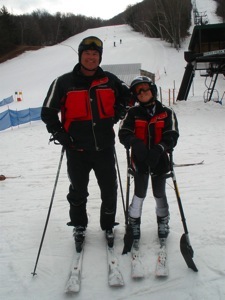Friday, December 18, 2009


By Marty Basch
The first time he skied the dauntingly steep double black diamond Vortex trail at Sunday River, Griffin LaMarre was apprehensive.
“I was pretty nervous and scared at first,’’ acknowledged the seventh-grader from Haverhill, Mass.
That’s not surprising for a teenager but LaMarre, 13, has tackled more super steeps like White Heat, and is being groomed with two other young skiers in the nonprofit Maine Handicapped Skiing program for a shot at the 2014 Paralympic Games in Russia.
“I just have to try to get faster and work on my technique,’’ LaMarre said from Breckenridge, Colo., where he and a handful of other developing MHS race team skiers were attending a US Paralympic Association Adaptive Alpine race camp and competing in a couple of NorAm races. “I have to train really hard and go to more races to get my points up.’’
More challenges
LaMarre has Hereditary Spastic Paraplegia, a progressive condition that weakens and stiffens his legs, forcing him to ski with outriggers, poles that mimic skis. Also at the camp was Lindsay Ball, 17, a visually impaired skier from Benton, Maine, who skis with a guide in front of her calling out directions as she runs the gates, and Alex Tomaszewski, 15, from Wells, Maine, who was born without the lower portion of his right leg. He’s the 2009 junior adaptive Alpine champion.
“We have these three kids, and others, who are very successful,’’ said MHS executive director Peter Adams. “They demonstrate the breadth of possibilities. They have adapted and figured out a way to get through what life throws at us.’’
MHS got its start in 1982 at Sunday River. From its bare-bones lodge and offices beyond the South Ridge base area, more than 350 children and adults with physical disabilities are introduced to Alpine skiing, cross-country skiing, and snowboarding for free from January through March. The year-round program also includes cycling, paddling, and golf.
Volunteers coach, teach, guide, and block (to give wider space away from able-bodied skiers), and are ski techs for gear such as the $3,500 sit skis that weigh about 30 pounds.
Rec to racing
The program largely caters to the recreational element. An Alpine racing team started nine years ago. The 14 skiers range from ages 13 to 55. Several ski at the national level while former MHS racers have moved on to the US Adaptive Ski Team and competed at the Paralympics, held after every Winter Games. Top-level skiers race in all disciplines: downhill, slalom, giant slalom, super-G, and super combined.
New racers first compete in the regional Diana Golden Series, a string of nine races held across the Northeast, beginning at Loon in Lincoln, N.H., Jan. 9, and ending at Mount Sunapee March 21. Racers who do well move up to the elite level.
Rich Nici, 35, from Jamaica Plain, Mass., broke his back in a car accident at age 18 and is a T8 paraplegic. Before his accident, he wasn’t a skier. Eventually, he found his way to MHS. But learning wasn’t easy. He had a tough time with balance.
“The program is free and that’s what kept me going,’’ Nici said from Colorado. “If I had to pay to get beat up and lay on my side in the cold snow I would not have continued. They let me keep going.’’
Nici said using a mono-ski is like riding a bicycle with no hands.
“I have a need for speed and I’m a competitive person by nature,’’ he said. “The combination of those two things led me to try racing.’’
Lots of work
For LaMarre, Ball, and Tomaszewski, life at racing’s national level consists of school during the week and weekend training at Sunday River. There’s dry-land training in the summer, too. LaMarre has two silver medals in the Golden Series and Ball was last season’s top female racer. Tomaszewski trains with the Gould Academy race team and wants a top-10 finish at the national championships.
Tony Lawless, 50, has seen their progress. He’s a self-described Type A personality, an adrenaline junkie who opted to have his left ankle amputated in 2001 after serious problems with arthritis. He’s been with the MHS program for a few years, first as a racer and now as a coach. He’s had the chance to mentor Tomaszewski and LaMarre at the entry level and watch Ball mature and develop on the slopes.
“These kids just make your day,’’ said Lawless, an innkeeper and chef at Pilgrim’s Inn in Deer Isle, Maine, during breaks as a volunteer at MHS. “Whatever their disability, they just want to ski race and have fun. They could easily sit at home on the couch and play Nintendo. The payback is smiles and success. Unless you experience it, you don’t know. You just don’t.’’

Courtesy photo of Alex Tomaszewski from Maine Handicapped Skiing

MHS photo of Tony Lawless (l) and Griffin LaMarre (r).


